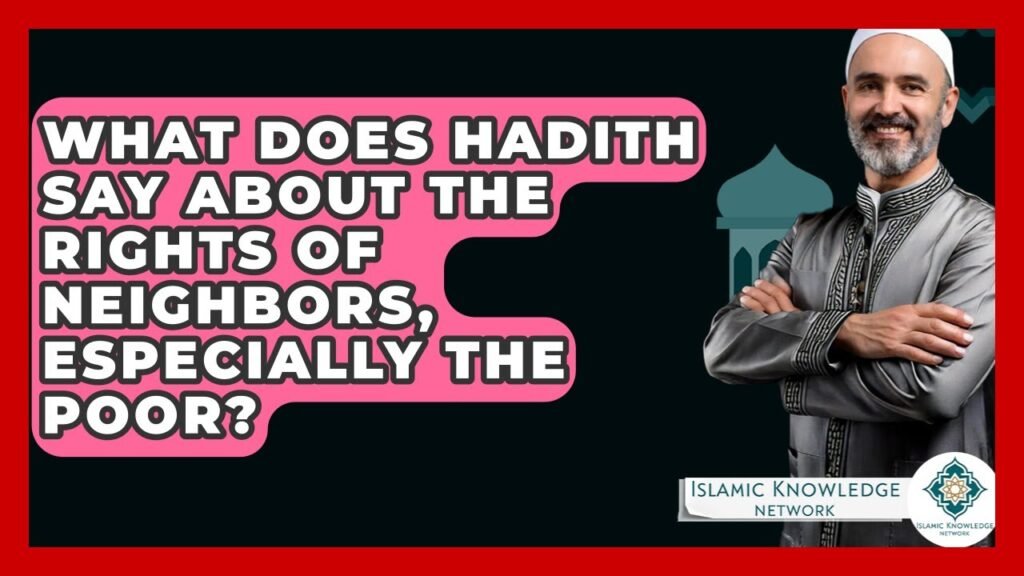You are here to read: What Do Hadith Teach About Neighbors’ Rights, Especially the Poor? – A Thoughtfully Written Guide Offering Spiritual Wisdom and Travel Advice for Every Pilgrim who is going on holy journey of Hajj or Umrah.
Introduction
In the rich tapestry of Islamic teachings, the concept of neighborly rights holds a significant place, underscored by the profound guidance found in Hadith. The welfare of one’s neighbors, particularly the less fortunate, is not merely a social obligation but a spiritual one as well. Islamic tradition emphasizes compassion, kindness, and support for those living nearby, reinforcing the community’s moral fabric. As we delve into the Hadith that illuminate these principles, we discover that taking care of the poor and nurturing relationships with our neighbors is central to embodying the true spirit of Islam.
At Airlink Hajj and Umrah, we recognize the importance of these teachings, especially during our journeys of faith. As you strive to fulfill your religious obligations, understanding these rights can enrich your spiritual experience and your interactions both at home and abroad. Our blog is dedicated to providing you with comprehensive updates on Hajj and Umrah, ensuring you stay informed and connected to the essential teachings of Islam. Join us as we explore the invaluable lessons from Hadith about neighborly rights, fostering a sense of community and compassion in your life and enhancing your pilgrimage experience.
What Do Hadith Teach About Neighbors’ Rights, Especially the Poor?
In Islam, the rights of neighbors are profoundly emphasized in various Hadith, reflecting the importance of community care and compassion. The Prophet Muhammad (peace be upon him) often spoke about how vital it is to look after one’s neighbors, especially those who are less fortunate. He said, “He is not a believer whose stomach is filled while the neighbor to his side goes hungry.” This highlights the moral obligation to ensure that even the poorest neighbors are not neglected.
Moreover, the Hadith advocate for kindness and generosity toward neighbors, particularly those in poverty. The encouragement to share food, offer assistance, and maintain a good relationship reflects a community-centered approach. It serves as a reminder that wealth should be shared, and kindness should be extended beyond one’s own family. By supporting our neighbors, we foster unity and social responsibility, essential tenets of community living.
Airlink Hajj and Umrah is dedicated to sharing insights not just about religious obligations but also about fostering good relationships within our communities. Explore our blog for all updates on Hajj and Umrah, and enrich your spiritual journey by embodying the values emphasized in the Hadith. Remember, taking care of our neighbors is as important as fulfilling our religious duties.
FAQ on What Do Hadith Teach About Neighbors’ Rights, Especially the Poor?
FAQs
1. What is the significance of neighbors’ rights in Hadith?
Hadith emphasize the importance of neighborly relations, highlighting compassion, assistance, and respect. They consider fulfilling neighbors’ rights a crucial aspect of faith and community harmony.
You're at the middle of this awesome post at AirlinkHajjandUmrah.com through: What Do Hadith Teach About Neighbors’ Rights, Especially the Poor?. Keep reading, it gets better!
2. How do Hadith address the rights of poor neighbors?
Many Hadith specifically encourage providing support to those in need, urging individuals to care for the less fortunate in their community. This includes sharing food, offering assistance, and ensuring that the poor are not neglected.
3. What actions are recommended in Hadith to support poor neighbors?
Hadith recommend acts such as giving charity (zakat), sharing meals, helping with household needs, and being considerate of a neighbor’s circumstances. Such acts foster goodwill and strengthen community ties.
4. Are there specific stories or examples in Hadith that illustrate these teachings?
Yes, several stories highlight individuals who went above and beyond to support their neighbors, especially during difficult times. These accounts serve as moral lessons about the importance of caring for one another.
5. How can individuals apply these teachings in modern society?
Individuals can apply these teachings by being proactive in community service, checking on neighbors, volunteering for local charities, and advocating for the rights of the poor, ensuring that they are included and supported within their communities.
That wraps up What Do Hadith Teach About Neighbors’ Rights, Especially the Poor?. Thanks for sticking with us till here! Share this: What Do Hadith Teach About Neighbors’ Rights, Especially the Poor? with your friends.
Check our homepage at Air Link Hajj & Umrah for more awesome updates.
Some interesting posts are: 1: Umrah Mubarak, 2: When is Umrah closed 2026?, 3: When does Umrah start after Hajj 2026?
Mushu, an experienced Saudi Arabia traveler and writer, shares insightful tips and spiritual reflections to enhance Hajj and Umrah journeys for fellow pilgrims. He has been to Makkah and Madina from 2016 to 2023 many times and his posts will reflect this.







